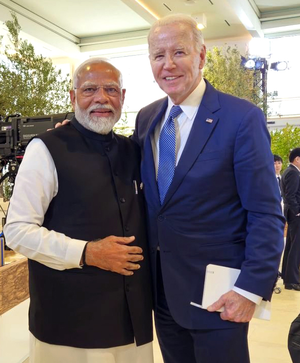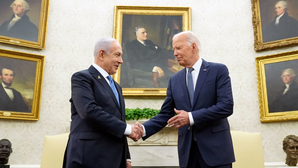Kavitha sits on her bed, lost in thought, holding a bangle she wears on her left hand.
“Praveen gave her the golden bangle last year on their anniversary,” says Anjamma, mother of 34-year-old Praveen Kumar.
Praven was an Uber driver, killed himself 24 days ago in Hyderabad, after he failed to pay his vehicle EMI for four months.
The moment Kavitha hears his name, tears roll down her cheeks.
The one bedroom house in Rasoolpura has a shelf with a watch and an old wallet, both of which belonged to Praveen.
The only picture of Praveen is on the top of a shelf, which has him and Kavitha, from nearly 9 years ago. The picture has been kept upside down.
“We are keeping all the pictures away, because she keeps looking at them and cries all day. We framed a picture of Praveen but took it down one week ago, because Kavitha stopped eating. She would stand in front of the picture and cry,” says Anjamma.
Praveen Kumar joined Uber seven months ago, and had been depressed for several months since he wasn’t able to pay the EMI, the family claimed.
“Everything was fine for the first month, but after that, he was worried most of the time,” Anjamma adds.
Before joining Uber, Praveen used to work as a private driver in Ameerpet, where he used to earn Rs.15,000 a month.
“With all the expenses we had, Rs.15,000 was not enough. Now, I feel that we would have managed. It was not worth his life, to earn a little extra money,,” says Kavitha, as she breaks into tears.
Praveen was living in the first floor of a house that he had taken a loan to build in Rasoolpura, with Kavitha and their two daughters. After his death, the family has been struggling to survive.
“For now, his brother has been sending money, but he also has his family to feed. We don’t know how we will survive,” says Anjamma.
Suraj, one of Praveen friends who rides an auto-rickshaw says that Praveen, who used to meet them frequently, did not have enough time after he joined Uber.
“When he was working in Ameerpet, he would come back by 8pm in the evening and we would sit in front of his house and talk for hours. After he joined Uber, he would meet us on Sundays for half an hour. After a month, he became too busy to meet. He would come home at 12am at night,” says Suraj.
Praveen’s 10-year-old daughter, Arsha, who has been quietly listening to everybody outside the bedroom, quickly adds, “Earlier, papa used to call and ask if we need chocolate. But later, he stopped asking or calling. We would be sleeping when he used to come back. Papa used to take us out twice a month for dinner, but for past few months, we did not go anywhere.”
Seven months ago, with a down payment of Rs 33,000, Praveen took a TATA Indica V2 car from a finance company through Uber.
However, he could only save Rs. 21,000 per month after expenses, even after working for 21 hours everyday, the family claimed.
He had to pay a monthly EMI of Rs 24,000, due to which he had been facing a huge financial crisis, they add.
“I drive an auto-rickshaw to drop students school and later pick them up and drop back home. I used to do that for his daughters also. However, four months ago, Praveen called me and said that he does not have enough money to pay me. He sounded stressed that time. As a friend, I should have known that he was facing some issues,” says Suraj.
Suraj remembers Praveen as one of his most reliable friends.
“He would joke all the time, and we used to laugh at all his jokes. But later on, he was lost in his thoughts most of time,” says Suraj.
Soon after Praveen failed to pay his monthly EMI, the family claimed that officials from the finance company would visit their house asking for money, and even harass them.
On February 12, at around 1am, Praveen reached home.
“The moment I opened the door, he collapsed. He repeatedly said ‘Amma, I have consumed poison. Take care of them’ and stopped moving. We rushed him to Gandhi Hospital that night,” Anjamma recalls.
The incident happened after the cab driver associations conducted a two-day protest against taxi aggregators, alleging lack of business.
Shiva Vulkundakar, president of Telangana Cab Drivers and Owners Association says that Praveen used to call the customer care of Uber everyday seeking help on the issue.
However, he did not get any response.
“Ola and Uber have been increasing the number of cabs in the city but the number of customers have not changed. This has made it hard for the drivers to make any profit. Those who had taken loans for cars have been struggling to repay the money,” says Shiva.
Even 24 days after Praveen’s suicide, the family is still coping with his loss.
“The company, Uber, has been luring people by advertising about profits to drivers, but all one can get is a huge amount of loans. We did not know he will take such a big step. Whom should I blame for my loss?” Kavitha asks.








